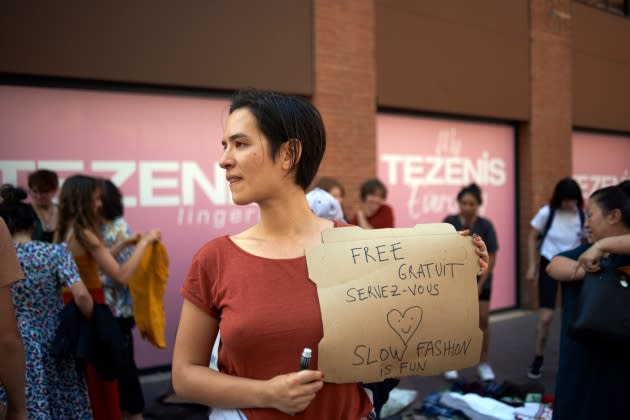
Trend Revolution’s newest report launched Thursday exhibits trend is unwell-concerned with measurable progress on warm-button sustainability troubles.
Now in its seventh edition, the Manner Transparency Index is an once-a-year report position 250 of the world’s largest fashion models and retailers based mostly on publicly offered data throughout human legal rights and environmental challenges. Given that November, Vogue Revolution has been conducting its analysis for this year’s report, including engagement and outreach to scoring manufacturers. The Laudes Basis is among the the funding companions.
Additional from WWD
According to the report, topline sustainability troubles like overproduction, offer chain transparency and residing wage details are frequently slipping by the wayside. Makes depict a cross-segment of the marketplace and are ranked between to 100 p.c (better currently being improved), in accordance to their disclosure on a 246-deep questionnaire. The questionnaire addresses a huge array of social and environmental subject areas, such as animal welfare, chemical and drinking water management, local weather, compelled labor, dwelling wages, getting techniques, provider disclosure and squander.
Brand names obtained an regular score of just 24 p.c, with practically a third of brands scoring significantly less than 10 percent.
Among the ideal-performers by Manner Revolution’s counts have been Italian model OVS, which scored greatest all over again this calendar year with 78 percent, tied with Kmart Australia and Concentrate on Australia. H&M, The North Experience and Timberland followed suit, tied at 66 p.c. A notable mover and shaker this 12 months was Dutch clothing chain Zeeman for likely above and over and above on its owing diligence-aligned provider code of conduct.
On the base rung of placement, 17 big manufacturers scored a dismal %, among them Jil Sander, Style Nova, Max Mara, Tom Ford and Elie Tahari. Findings have been not prescriptive to every manufacturer but observed a absence of general public disclosure on governance, insurance policies and much more.
Local weather, supplier due diligence and forced labor indicators were between the telling pain points affecting the total scores.
Even with the urgency of the local weather crisis, significantly less than just one-3rd of key models disclose a decarbonization focus on masking their overall supply chain, which is verified by the prevalent corporate safeguard the Science-Centered Targets Initiative. Only 11 % of manufacturers publish their provider wastewater take a look at outcomes, inspite of the textile marketplace remaining a leading contributor to water pollution. And the the vast majority of models, or 85 %, do not disclose their once-a-year creation volumes even with mounting apparel squander. Most key brand names and shops, or 96 percent, do not publish the range of personnel in their provide chain who are paid a dwelling wage.
Finding it difficult to steer towards any one particular dominant perception, Liv Simpliciano, Vogue Revolution’s plan and investigate supervisor and report research direct, pressured in a phone dialogue with WWD: “They’re all interrelated and all have nuance…What surprised me the most was 125 out of 250 brands’ total rating is involving and 5 per cent. I imagine it’s actually stark that we have these kinds of small disclosure.”
Homing in on a number of outliers, she claimed purchasing procedures are in an “abysmal” condition of affairs with only 11 per cent of brand names abiding by a suggested purchasing code of perform that defines 60-day payment conditions. Payment terms have an affect on the skill of makers and personnel to get paid in a well timed way.
Simpliciano also referred to as notice to how this year’s report consists of new indicators of modern-day slavery. Compelled labor turned an location of scrutiny amid tainted cotton from Xinjiang and ongoing investigations into U.K. speedy manner shops.
Guidelines like the Employer Pays Theory, which instructs firms on accountable recruitment (as trend is an sector of attract to migrant employees who are recruited by factories and might face number of entry-degree alternate options if undocumented) and to pay the comprehensive prices of recruitment, underpin Vogue Revolution’s tips and methodology. “I consider it’s also critical to try to remember that indebted personnel are significantly less likely to discount for greater shell out due to the fact they are already in an exploited and vulnerable placement,” Simpliciano explained.
Vogue Revolution believes that after transparency comes good scrutiny, accountability and last but not least — adjust.
Simpliciano claimed she expects a style transparency “reckoning” in the in the vicinity of long run, supplied the controversy all over leading tools. The nonprofit will be aspect of an impending initiative termed “Good Outfits, Truthful Pay” which launches July 19 in an intention to garner awareness — and signatures — for dwelling wage laws in the EU. Fashion Revolution also operates community strategies this sort of as its notorious “Who Designed My Clothing?”
Signal up for WWD’s E-newsletter. For the hottest news, adhere to us on Twitter, Fb, and Instagram.






